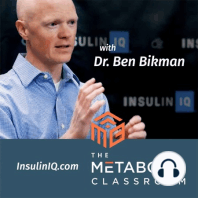18 min listen

Why Anti-Diabetic Drugs Usually Make Things Worse
Why Anti-Diabetic Drugs Usually Make Things Worse
ratings:
Length:
38 minutes
Released:
Feb 22, 2024
Format:
Podcast episode
Description
In today's lecture, Dr. Bikman guides his audience through a comprehensive exploration of anti-diabetic drugs, shedding light on their mechanisms, implications, and the broader context of diabetes management. Kicking off the discussion, Dr. Bikman elucidated the prevalent glucose-centric paradigm in understanding diabetes, emphasizing its limitations, particularly in discerning the nuanced differences between type 1 and type 2 diabetes. He underscored the pivotal role of insulin deficiency in type 1 and insulin resistance in type 2 diabetes, setting the stage for a deeper dive into the intricacies of anti-diabetic medications.The lecture commenced with an in-depth analysis of metformin, a cornerstone in diabetes treatment known for its efficacy in improving insulin sensitivity. Despite its widespread use, Dr. Bikman elucidated the persistent ambiguity surrounding metformin's cellular mechanisms, particularly concerning its impact on mitochondrial function. While acknowledging its beneficial effects, such as reducing hepatic glucose production, Dr. Bikman also highlighted the drug's gastrointestinal side effects and its potential to blunt mitochondrial adaptations to exercise.Transitioning to insulin therapy, Dr. Bikman delineated its indispensable role in type 1 diabetes management but cautioned against its potential risks in type 2 diabetes, including weight gain and heightened cardiovascular, cancer, and Alzheimer's disease risks. He delved into the nuances of insulin secretagogues and thiazolidinediones, discussing their mechanisms and associated complications, such as increased cardiovascular risk and adverse effects on adipogenesis.Further, Dr. Bikman explored GLP-1 agonists and SGLT2 inhibitors, elucidating their mechanisms of action and potential side effects, including an elevated risk of urinary tract infections with SGLT2 inhibitors and heightened ketogenesis. Before concluding, he briefly touched on amylin analogs, adding another dimension to the multifaceted landscape of anti-diabetic medications.Dr. Bikman's lecture provided a comprehensive understanding of anti-diabetic drugs, transcending the traditional glucose-centric perspective and highlighting the complexities inherent in diabetes management. By navigating through the intricate mechanisms and implications of these medications, he empowered his audience with invaluable insights to navigate the complexities of diabetes treatment effectively.#insulinresistance #metabolicsyndrome #metabolichealth #type2diabetes #type1diabetes #weightloss #intermittentfasting #intermittantfasting #fasting Learn more at: https://www.insuliniq.com Hosted on Acast. See acast.com/privacy for more information.
Released:
Feb 22, 2024
Format:
Podcast episode
Titles in the series (52)
Control Fat By Burning Fat by The Metabolic Classroom with Dr. Ben Bikman